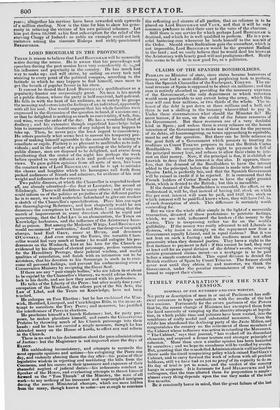CLAIMS OF THE SPANISH BONDHOLDERS.
PERHAPS no Minister of state, since states became borrowers of money, ever had a more difficult and perplexing task to perform, than the Spanish Chancellor of the Exchequer, TORENO. The an- nual revenue of Spain is supposed to be about six millions ; and this sum is entirely absorbed in providing for the necessary expenses of the Government,—the only department in which reduction would seem practicable to any extent being the army, which this year will cost four millions, or two thirds of, the whole. The in- terest of the debt is put down at three millions and a half, and there is not a shilling in the treasury wherewithal to pay it. Under these circumstances what should the Minister do? He must borrow, if he can, on the credit of the future resources of his Government. But these resources are of a very doubtful kind in Spain ; and unless there is every reliance on the honest intention of the Government to make use of them for the payment of its debts, all loanmongering, on terms approaching to equitable, must be out of the question. But there can be little reliance on the good faith of a Government which persists in treating its creditors as Count TOREN() proposes to treat the British Cortes Bondholders. He recognizes their right to payment in full of the principal money lent, and refuses to allow their claim to inte- rest on that money. Now, if the principal is due, it is childish or knavish to deny that the interest is due also. It appears, there- fore, that the demand of the Bondholders to have the interest added to the principal, before the division is made into Active and Passive Debt, is perfectly fair, and that the Spanish Government will be ruined in credit if it be rejected. It is rumoured that the French holders of Cortes' Bonds are to have the right granted them, which is denied to the British; but this is incredible.
If the demand of the Bondholders is conceded, the effect, as we understand it, will be, that instead of having 50/. stock on which five per cent. interest will soon be paid, and 102/. 108. stock on which interest will be paid God knows when, they will have 76!. 5s. of each description of stock. This difference is certainly worth contending for.
But we view the whole affair simply in the light of a mercantile transaction, divested of those pretensions to patriotic feelings, which, we are told, influenced the lenders of the money to the Cortes. This is trespassing rather too far on the world's gullibility. If the money was really advanced to aid Liberals in distress, why insist so strongly on the repayment now from a Government equally Liberal, and in equal distress? But it was not lent on such a footing ; and the creditors must not affect generosity when they demand justice. They have a right in the first instance to payment in full : if this cannot be bad, they may at least call for an equal division of the debtor's assets, reserving certain guaranteed claims intact—as a mortgage is to be paid
before a simple contract debt. This equal division is denied the British creditors of Spain by Count TOREN°. The former should
never rest until they obtain it; and moreover, we think the Government, under the peculiar circumstances of the case, is bound to support their claim.




















 Previous page
Previous page